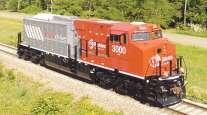Pennsylvania Diverts Road Funds to Pay for State Police

Money from increased fees and gas taxes that drivers have been paying since 2013 on the promise to fix Pennsylvania's crumbling roads and bridges is increasingly being diverted to support the state police, budget figures show.
Many government officials, legislators and construction industry members said the practice needs to stop, especially as the nation's highest gas tax — ushered in by the 2013 transportation funding overhaul known as Act 89 — generates billions in new revenue for roads.
Pennsylvania's unfunded transportation needs outweigh expected 12-year revenue by about $6 billion, and that number will only grow if state police continue to receive money that would otherwise be spent on maintenance and infrastructure projects, PennDOT Secretary Leslie Richards said.
“What's at stake is the actual promise of delivering on Act 89, which obviously is huge,” she said.
But a better way to properly fund infrastructure improvements and public safety services eludes policymakers.
The 2016-17 fiscal code lawmakers passed and Gov. Tom Wolf signed seeks to reduce the state police's allotment from the Motor License Fund over several budget cycles.
But lawmakers and state officials have yet to come up with an alternative funding source for the nation's 10th-largest police agency. The agency covers more than 36,000 square miles, including nearly 1,300 municipalities that rely solely on state police for law-enforcement coverage, and another 400 that rely on it part time.
“Working together we can come up with a solution,” Wolf spokesman Jeffrey Sheridan said. “What that solution is, I don't know at this time.”
Pennsylvania's $6.5 billion Motor License Fund captures gasoline taxes, vehicle registration and licensing fees and other revenue. It gets the new revenue generated by Act 89's taxes and fee increases — a funding stream expected to total at least $2.3 billion annually for transportation infrastructure projects by fiscal year 2017-18.
During Act 89's creation and passage, state officials touted the measure as a way to provide safer bridges and roads, smoother pavement and stable public transit services.
Related construction projects are expected to generate tens of thousands of jobs as the state builds “a stronger Pennsylvania both now and in the future,” then-Gov. Tom Corbett said in a 2014 news release.
“Safety on public highways” is an allowable Motor License Fund expense, according to the state constitution. The fiscal year 2016-17 budget diverts about $802 million in Motor License Fund money to state police, about 67% of the agency's $1.2-billion budget. About $257 million comes from the general fund.
The Motor License Fund allocation to state police totaled about $750 million in the 2015-16 budget and about $583 million in the 2012-13 budget before Act 89, according to PennDOT.
PennDOT sustains a construction program that ranges between $2.4 billion and $2.5 billion annually. Act 89 funding allowed the state to award 607 construction contracts in 2015, with 750 contract awards expected in 2016, officials said. Without Act 89, PennDOT's construction budget would total about $1.5 billion annually.
Depending on gas prices, John Oakes spends between $20,000 and $30,000 per year on fuel for his Bethel Park business called All Pro Plumbing. He called the state police funding arrangement a “terrible structure.”
The state police "should have their own program to inject money into their system, whether it's from citations or whatever,” he said. Some money from state police citations goes into the Motor License Fund, but not directly to the agency.
Oakes, 34, said he always tries to keep five trucks fueled up and ready to respond to work. That requires spending a lot of money at the pump. And, like every driver, a portion of what he pays goes into the Motor License Fund.
Pennsylvania drivers pay the nation's highest gas tax rate — 70 cents per gallon as of July, nearly 20 cents more than the national average, according to the American Petroleum Institute.
The state's average per-gallon cost also ranks among the highest in the country, said Patrick DeHann, senior petroleum analyst at GasBuddy.com. The figure this week was about $2.31 per gallon compared with $2.20 per gallon nationwide.
DeHann attributed the relatively high prices to Act 89.
“Motorists are certainly bearing the brunt of 100% of the increase that was passed on,” he said. “That's kept Pennsylvania's gas prices well above the national average, and that's not likely to change anytime soon.”
Oakes lives on state-owned Clifton Road, which he said could benefit from some of the gas tax revenue he's helped generate. Still, he offered few complaints about the taxes he pays at the pump, given this summer's overall low gas prices compared to years past. At the end of the day, he's worried most about that bottom line.
“Wait until it goes back to $4 per gallon,” he said. “Then I'll have a reason to complain.”
Diverting money from the Motor License Fund to state police isn't new. Historically, Motor License funding has made up nearly two-thirds of the state police budget. Firms getting part of Pennsylvania's $2.5 billion highway budget questioned whether that proportion matches the agency's highway safety efforts.
“We do not believe that 65% of state police resources are devoted to patrolling highways, although no one knows definitively what that proportion might be,” Pennsylvania Highway Information Association President James Van Buren said in written testimony for a legislative committee hearing in February.
State police referred an interview request for this story to the governor's office.
The agency's commissioner, Col. Tyree Blocker, said during a legislative hearing that, “The overwhelming majority of state police efforts are dedicated to patrolling our highways and keeping them safe.”
Sheridan said the state police funding problem boils down to a common issue with Pennsylvania's finances. Revenue doesn't cover the services residents expect from the state, the result of “years of budgets built on smoke and mirrors.”
“We're trying to fix those problems,” he said. “It's obviously been a very slow haul, and we've made progress.”




